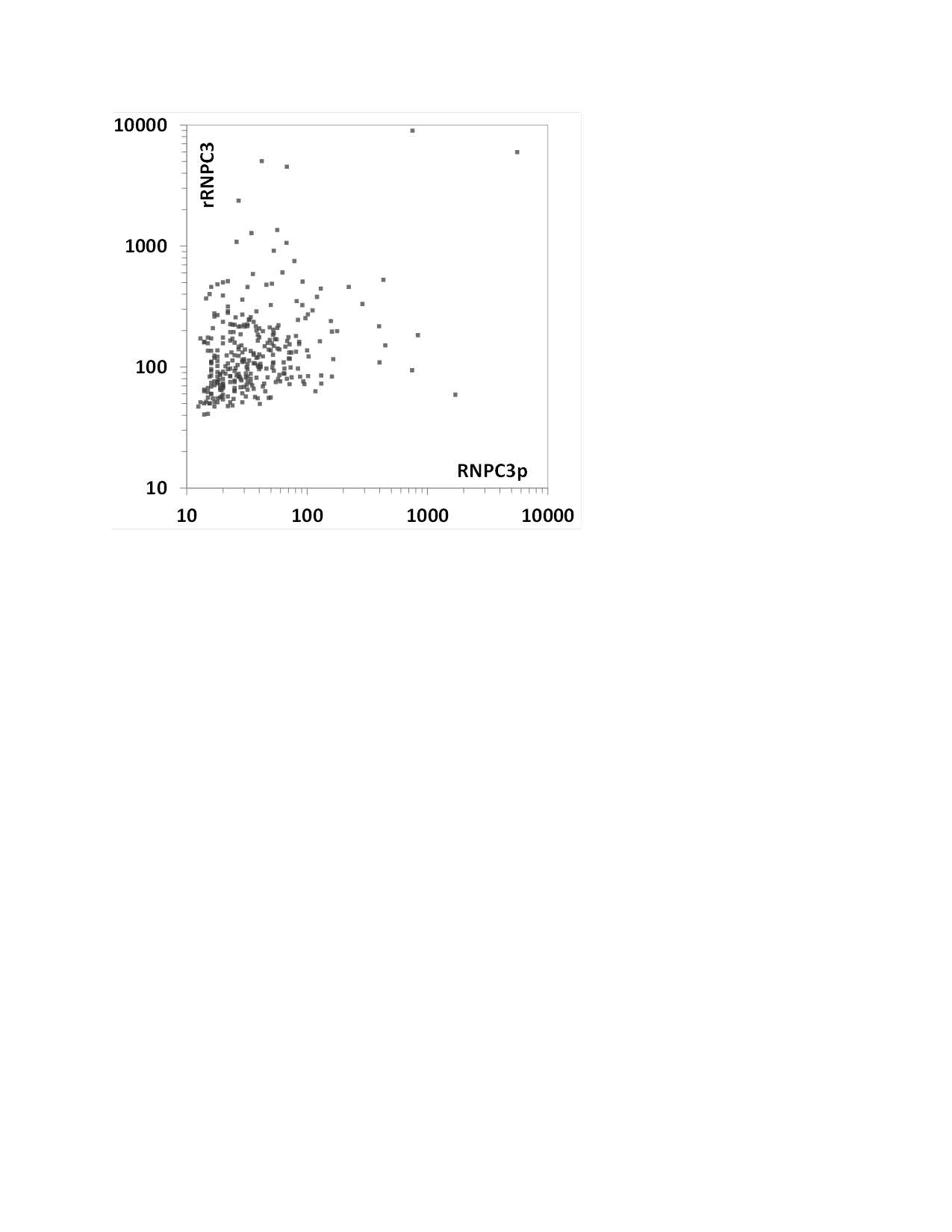Session Information
Date: Tuesday, November 12, 2019
Title: Systemic Sclerosis & Related Disorders – Clinical Poster III
Session Type: Poster Session (Tuesday)
Session Time: 9:00AM-11:00AM
Background/Purpose: Anti-nuclear antibodies (ANA) are present in approximately 90% of sera from systemic sclerosis (SSc) patients and play an important diagnostic and prognostic role in SSc. Besides anti-Scl-70 (topo I), anti-centromere and anti-RNA Polymerase III which are included in the SSc classification criteria, several other antibodies can be found, some of which clearly associate with defined disease phenotypes. Anti-U11/12 Ribonucleoprotein (RNP) antibodies have been reported in a small portion of SSc patients especially with pulmonary fibrosis. RNPC-3, also known as U11/U12 small nuclear ribonucleoprotein, is a 65 KDa protein that has been reported as an autoantibody target and to be associated with a nuclear speckled indirect immunofluorescence (IIF) pattern on HEp-2 cells. Recently we described a novel linear B-Cell epitope that was used for the development of an autoantibody assay to detect a subpopulation of anti-RNPC-3 antibodies. Our aim in this study was to determine the prevalence of anti-RNPC-3 antibodies in a cohort of well characterized SSc patients and to assess clinical associations.
Methods: A total of 299 SSc patient samples from a large research cohort enriched for samples with a nuclear speckled IIF pattern were tested using a novel particle-based multi-analyte technology (PMAT) for antibodies to recombinant RNPC-3 (rRNPC-3) and the newly described RNPC-3 derived peptide (RNPC-3p). Immunoadsorption experiments by liquid phase inhibition was carried out to estimate the contribution of antibodies to the novel B-cell epitope compared with the whole anti-RNPC-3 antibody response. Clinical and serological associations were ascertained.
Results: The levels of antibodies to rRNPC-3 and RNPC-3p correlated moderately (See Figure, Spearman=0.32, p=0.0001; chi-squared p=0.0002). As expected, levels of anti-RNPC-3p antibodies were higher in patients positive for the recombinant antigen (p=0.0013). Both rRNPC-3 and RNPC-3p were associated with a speckled pattern. Immunoadsorption showed significant inhibition using the RNPC-3 derived peptide, but not with a control peptide. Prevalence and levels of anti-RNPC-3 antibodies were higher in anti-Scl-70, anti-Cenp, and/or anti-RNA Pol III triple negative patients [10/106 (9.4%) vs. 6/193 (3.1%), p=0.03; and median titers 122.0 vs. 107.5, p=0.08]. Patients positive for anti-RNPC-3 antibodies tended to have more interstitial lung disease, especially when considering follow-up. None of the clinical associations reached statistical significance most likely due to limited sample size and prevalence of anti-RNPC-3 antibodies.
Conclusion: Our study confirms the association of anti-RNPC-3 antibodies with the nuclear speckled IIF pattern and their increased prevalence in SSc triple negative patients (anti-Scl-70, anti-centromere, and anti RNA-Pol III antibodies). The previously identified RNPC-3 peptide represents a significant target of anti-RNPC-3 antibodies, but does not capture the entire reactivity indicating the presence of additional epitopes. Further studies are needed to verify the clinical utility of the assays.

Table Clinical characteristics
To cite this abstract in AMA style:
Mahler M, Roup F, Bentow C, Hudson M, Baron M, Choi M, Fritzler M. Anti-RNPC-3 Antibodies Are Associated with Nuclear Speckled Immunofluorescence Pattern and Enriched in Triple Negative Systemic Sclerosis Patients [abstract]. Arthritis Rheumatol. 2019; 71 (suppl 10). https://acrabstracts.org/abstract/anti-rnpc-3-antibodies-are-associated-with-nuclear-speckled-immunofluorescence-pattern-and-enriched-in-triple-negative-systemic-sclerosis-patients/. Accessed .« Back to 2019 ACR/ARP Annual Meeting
ACR Meeting Abstracts - https://acrabstracts.org/abstract/anti-rnpc-3-antibodies-are-associated-with-nuclear-speckled-immunofluorescence-pattern-and-enriched-in-triple-negative-systemic-sclerosis-patients/


